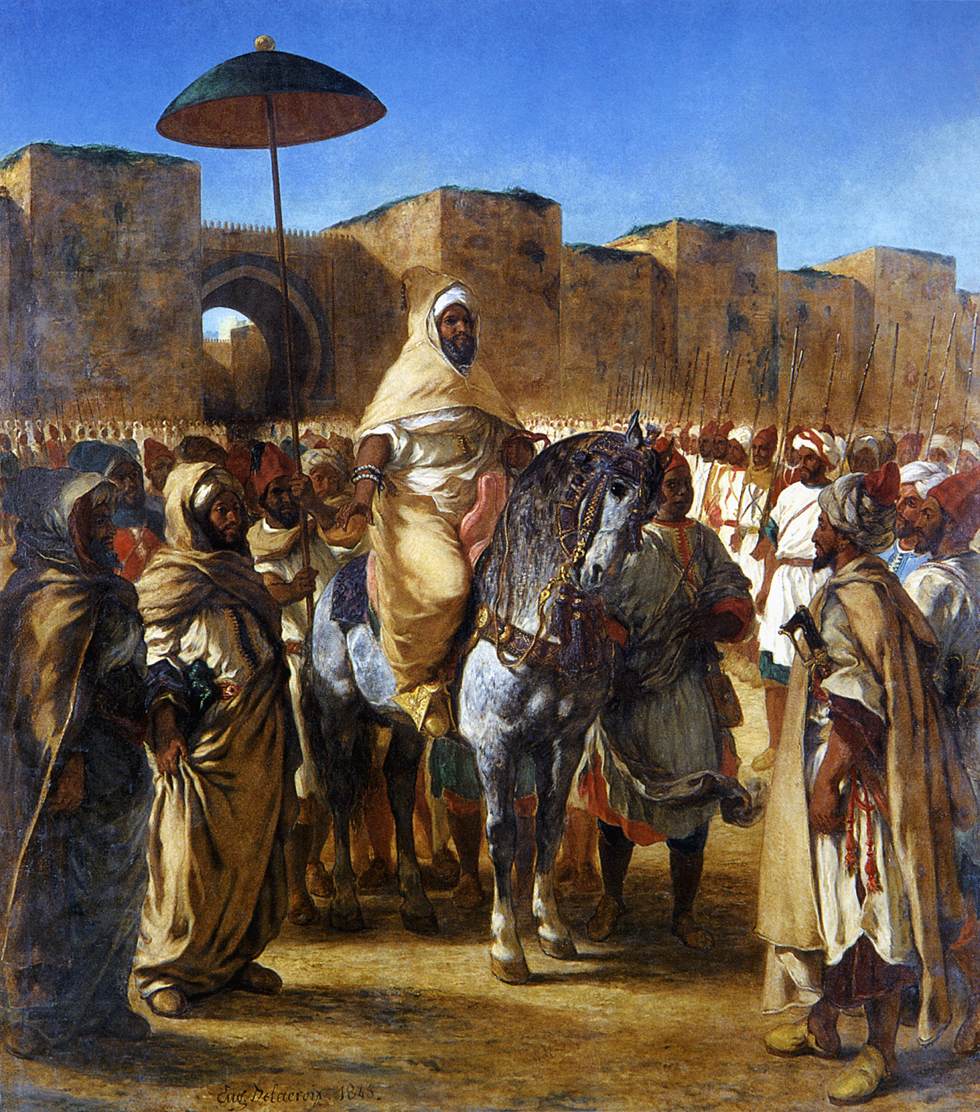
The Moors were the medieval Muslim inhabitants of al-Andalus (the Iberian Peninsula including present day Spain and Portugal) as well as the Maghreb and western Africa, whose culture is often called Moorish. The word was also used more generally in Europe to refer to anyone of Arab or African descent, sometimes called Blackamoors. The name Moors derives from the ancient tribe of the Maure and their kingdom Mauretania. Andalusia under Muslim rule produced a society in which culture and science and learning flourished. Muslims, Jews and Christian co-existed in a spirit of mutual tolerance. Much scholarship from this period impacted on European learning, especially via such people as Roger Bacon and Thomas Aquinas. The Fall of Granada in 1492 saw the end of the Muslim presence in Andalusia. This event has had a global impact, giving impetus to the Spanish conquest of the New World inspired by their triumph over the Muslims, which they understood as enjoying God’s blessing. What has been described as the Andalusian paradigm suggests that conflict and rivalry is not inevitable for plural societies, that people of different faiths can co-existence and enjoy creative intellectual and cultural exchange.
In 711 C.E., the Moors invaded Visigoth, Christian Hispania. Under their leader, an African Berber general named Tariq ibn-Ziyad, they brought most of the Iberian Peninsula under Islamic rule in an eight-year campaign. They attempted to move northeast across the Pyrenees Mountains but were defeated by the Frank, Charles Martel, at the Battle of Tours in 732 C.E. The Moorish state suffered civil conflict around 750 C.E. The Moors ruled in the Iberian peninsula, except for areas in the northwest (such as Asturias, where they were stopped at the battle of Covadonga) and the largely Basque regions in the Pyrenees, and in North Africa for several decades. Though the number of “Moors” remained small, they gained large numbers of converts. The Moor’s invasion of Spain, from the point of view of Christians in Europe, was always regarded as an act of aggression. Indeed, it was part of the outward expansion of the Islamic world that was informed by the conviction that the whole world should be subject to Islamic rule and to the divine law of Islam. However, the actual story of the invasion is more complex. The Visigoth King, Roderic had raped the daughter of one of his Counts, Julian who, in secret, approached the Moors and pledged support in the event of an invasion. Jewish advisers also accompanied the invading force. There is also evidence that some territory was gained peacefully through treaties that enlisted the “cooperation of local administrators and inhabitants.” Constable (1997) reproduces a “Muslim-Christian Treaty” of 713 in which the ruler of Tudmir and his people are promised protection and religious freedom in return for an annual tribute and loyalty to the Sultan.
The Umayyad’s sultanate (756 – 929C.E.) and later caliphate of Cordoba (929 – 1031C.E.) in Andalusia (modern Spain) rivaled the Abbasids at a time when the Fatimids also challenged their supremacy, and provides an example of an Islamic society where scholarship (which was already patronized by the early Damascus based Umayyads) and inter-community exchange
Christian states based in the north and west slowly extended their power over the rest of Iberia. The Kingdom of Asturias, Navarre, Galicia, León, Portugal, Aragón, Catalonia or Marca Hispanica, and Castile started a steady process of expansion and internal consolidation during the next several centuries under the flag of Reconquista. The initial rule of the Moors in the Iberian peninsula under the Caliphate of Cordoba is generally regarded as tolerant in its acceptance of Christians, Muslims and Jews living in the same territories, though Jews were expelled in various periods and Christians relegated to 2nd class status under Muslims. The Caliphate of Córdoba collapsed in 1031 and the Islamic territory in Iberia came to be ruled by North African Moors of the Almoravid Dynasty. This second stage started an era of Moors rulers guided by orthodox Islam leaving behind the more tolerant practices of the past. It was during this period that the great Jewish scholar Moses Maimonides was forced to leave Andalusia, although he found refuge in another part of the Muslim world. Even in the intolerant Almohads (who seized power in 1145C.E.) threatened Jews with death or expulsion if they did not convert but later entered into alliances with Christian rulers and even encouraged Christian to settle in Fez. With the fall of the Ummayad caliphate, the period of small city-states, or taifa, began
History
Capone warily respected Sicilian Lucky Luciano, but regarded him as less of a Sicilian and more like the pragmatic Jews he grew up among in New York. Two of Luciano’s closest allies were Bugsy Siegel and Meyer Lansky.
Al Capone net worth: Al Capone was an American gangster who had an inflation-adjusted net worth of $100 million at the time of his death.
The Genovese family is the oldest and the largest of the “Five Families”.

Breaking free of self and the walls built inside is hard work until it is a recognized behavior within & the exercise of wholeness is a daily ritual. Alone the way there are mirror reflections that cross to aid in the untangling of old thoughts, behaviors, and doing releasing the old to offer in new. Cycles are reoccurring pictures that comes in multiple looks to aid you pass that old look into a newly developed picture of self & life. It is not to break you, hurt you, nor tare you down although it at times feel as such; more so as it is to open up and build you up continuously just as the cycle of old you come into now a cycle of newness continuously…
Please take a moment and digest that thought…
Untruan Grant





 The Force Awakens: Aiden Anderson’s Rise in Dallas Amateur Boxing
The Force Awakens: Aiden Anderson’s Rise in Dallas Amateur Boxing  Thomas Edward Patrick Brady Jr, Shedeur Sanders, Travis Hunter, Shilo Sanders, Jimmy Horn Jr, Global Don, and more
Thomas Edward Patrick Brady Jr, Shedeur Sanders, Travis Hunter, Shilo Sanders, Jimmy Horn Jr, Global Don, and more  Denver Public Schools has resolved to shut down seven schools, facing considerable opposition in the process.
Denver Public Schools has resolved to shut down seven schools, facing considerable opposition in the process.  The Real Spill Talk Show -Overwhelming Friends-
The Real Spill Talk Show -Overwhelming Friends-  SNACO
SNACO  Was it really about the Lil Wayne Concert
Was it really about the Lil Wayne Concert  David Mingo: A Denver Boxing Legend and Community Pillar
David Mingo: A Denver Boxing Legend and Community Pillar  Sofia Llamas: A Force for Good in Colorado – Igniting Hope and Empowering Communities
Sofia Llamas: A Force for Good in Colorado – Igniting Hope and Empowering Communities  Trump administration offers to pay plane tickets, give stipend to self-deporting immigrants
Trump administration offers to pay plane tickets, give stipend to self-deporting immigrants